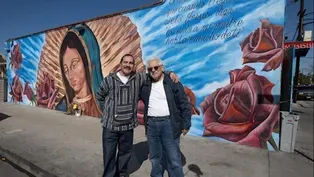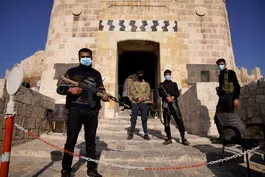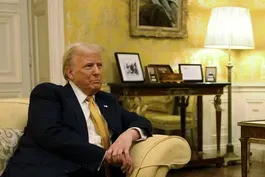
What to expect from the Syrian opposition coming to power
Clip: 12/9/2024 | 6m 20sVideo has Closed Captions
What to expect from the Syrian opposition coming to power after toppling Assad
For perspective on the collapse of the Assad regime in Syria and the opposition that's coming to power, Amna Nawaz spoke with Murhaf Jouejati. He’s a distinguished visiting professor at the U.S. Naval Academy and the former chairman of The Day After, a nonprofit organization that's been working toward building democratic institutions in Syria.
Problems with Closed Captions? Closed Captioning Feedback
Problems with Closed Captions? Closed Captioning Feedback
Major corporate funding for the PBS News Hour is provided by BDO, BNSF, Consumer Cellular, American Cruise Lines, and Raymond James. Funding for the PBS NewsHour Weekend is provided by...

What to expect from the Syrian opposition coming to power
Clip: 12/9/2024 | 6m 20sVideo has Closed Captions
For perspective on the collapse of the Assad regime in Syria and the opposition that's coming to power, Amna Nawaz spoke with Murhaf Jouejati. He’s a distinguished visiting professor at the U.S. Naval Academy and the former chairman of The Day After, a nonprofit organization that's been working toward building democratic institutions in Syria.
Problems with Closed Captions? Closed Captioning Feedback
How to Watch PBS News Hour
PBS News Hour is available to stream on pbs.org and the free PBS App, available on iPhone, Apple TV, Android TV, Android smartphones, Amazon Fire TV, Amazon Fire Tablet, Roku, Samsung Smart TV, and Vizio.
Providing Support for PBS.org
Learn Moreabout PBS online sponsorshipAMNA NAWAZ: For more perspective on the collapse of the Assad regime and the opposition that's coming to power, we turn now to Murhaf Jouejati.
He's a distinguished visiting professor at the U.S.
Naval Academy and the former chairman of The Day After.
That's a nonprofit organization that's been working toward building democratic institutions in Syria.
Murhaf, good to see you.
Thanks for being here.
MURHAF JOUEJATI, United States Naval Academy: Thank you.
Thank you.
AMNA NAWAZ: I just want to start with your reaction as we have been watching these scenes unfold in Syria and people cheering in the streets.
What has that been like for you to see?
MURHAF JOUEJATI: I am absolutely elated.
I'm elated, just as the Syrians inside Syria and the Syrians outside of Syria.
This has been a tragic moment for the Syrians for the past 50 to 60 years of martial law, of tyranny, of imprisonment, enslavement, torture.
This has been really a murderous regime that is corrupt and that has put Syrians through a lot.
And so, 60 years later, imagine, suddenly, we are free.
The Syrians are free.
So it's a moment of total elation.
AMNA NAWAZ: Also a moment of great uncertainty, because we don't yet know what comes next.
When you look at the promises made by this leader of HTS, al-Jolani, what do you make of his pledge to build a pluralistic, tolerant society?
MURHAF JOUEJATI: I don't simply go by his pledge.
I go by the history of Hay'at Tahrir al-Sham, the organization that he dominates in the province of Idlib, where they have now an experience in governance, where he has allayed the fears of minorities, where he has not imposed hijab and so on, on women.
So I go by these things, in addition to the fact that very recently he has communicated with the elders of the Alawites, the sectarian minority.
AMNA NAWAZ: That had previously backed the Assad regime.
MURHAF JOUEJATI: That backed the Assad regime.
AMNA NAWAZ: Yes.
MURHAF JOUEJATI: And they are on board with him.
And this is extremely significant.
Recently, he has nominated the cardinal of Aleppo to be mayor of Aleppo.
And the cardinal declined because he doesn't want to be in a political position.
Sunday, the church bells were ringing in Damascus.
So, again, he has been bending over backwards to allay the fears of minorities.
AMNA NAWAZ: At the same time, I should ask -- and you saw Jon Finer mention this -- the fact that there is still a U.S. terrorist designation this group, on HTS.
A precursor group, al-Nusra, did have links to al-Qaida.
And we should also point out that al-Jolani himself was the man against who the U.S. government issued a stop this terrorist effort, offering $10 million in a reward for anyone helping to track him down.
So do you see that designation being lifted?
And are we sure there are no ties to al-Qaida that remain?
MURHAF JOUEJATI: All these accusations are very true.
However, Jolani did break away from al-Qaida.
He even fought al-Qaida and he fought ISIS.
And this is not only words, but there is evidence of this.
So this designation of terrorism is in the past.
Obviously, we should trust and verify.
We shouldn't only take him by his words, but by his actions.
And we will see what will happen in the days and the weeks ahead.
What encourages me very much is that he is now coordinating and cooperating with the former regime prime minister in order to have a transition of all these major files, health care, water, electricity and so on, to be taken to the next transitional administration, so that there would be continuity in Syria's state institutions.
This is very significant, and it tells us about the intentions of not only him and his organization, but the coalition of forces that joined him in liberating Damascus.
AMNA NAWAZ: I want to ask you as well about Israel's decision to move military forces into Syria, seizing territory in a demilitarized zone there that was part of a 1974 cease-fire.
They claim that it's a temporary defensive position.
Some see it as a land grab.
How do you look at that?
MURHAF JOUEJATI: Israel has always expanded and said it would temporarily expand.
I see this as a land grab.
I do not agree with Mr. Netanyahu, who says that all this liberation of Syria was triggered directly by Israeli bombing, because, in 2011, when there was a peaceful, popular uprising of the Syrian people against the Assad regime and it failed, it failed because of the intervention of the Russian air force and of Iranian and Iranian pro-militias that propped up the Assad regime.
So this has little to do with the Israeli adventures in the Middle East.
I think this is a land grab.
I don't think it is temporary.
I think Israel will remain there to stay.
AMNA NAWAZ: Well, time will tell.
We will see.
But I need to ask you as well about the millions of Syrians who have been displaced over these many years of war.
I remember myself being on that Turkish border and visiting with many of them in the camps there.
Children who have been born in the camps had never even set foot back in Syria.
What do you see as their future?
Will they be allowed to return home?
MURHAF JOUEJATI: My dear friend, we have to only look at the footage at the tens of thousands of refugees outside Syria, mainly in Turkey -- there are three million in Turkey -- that are returning home now to reclaim their properties and to reclaim their lives and to be with their families and loved ones.
They want to return to Syria.
and they will, and they are certainly welcome.
AMNA NAWAZ: Murhaf Jouejati, distinguished professor at the U.S.
Naval Academy, thank you so much for being with us here today.
We appreciate your time.
MURHAF JOUEJATI: Thank you.
My pleasure.
Thank you for having me.
Jury acquits man charged after NYC subway chokehold death
Video has Closed Captions
New York jury acquits former Marine charged after subway chokehold death (7m 1s)
LA arts program gives addicts and ex-cons escape to new life
Video has Closed Captions
East LA arts program gives addicts and ex-cons an escape to a new life (6m)
Syria seeks to build government after fall of Assad
Video has Closed Captions
Syria seeks to build functioning government after fall of autocratic Assad dynasty (5m 31s)
Trump lays out agenda on border, tariffs in interview
Video has Closed Captions
Trump lays out agenda on border, tariffs and potential political retribution in interview (7m 4s)
What we know about man detained in health care CEO killing
Video has Closed Captions
What we know about the person of interest detained in health care CEO killing (8m 3s)
White House: Future of Syria depends on 'choices they make'
Video has Closed Captions
White House says future of Syrian people depends on 'choices they make' (6m 6s)
Providing Support for PBS.org
Learn Moreabout PBS online sponsorshipSupport for PBS provided by:
Major corporate funding for the PBS News Hour is provided by BDO, BNSF, Consumer Cellular, American Cruise Lines, and Raymond James. Funding for the PBS NewsHour Weekend is provided by...

















